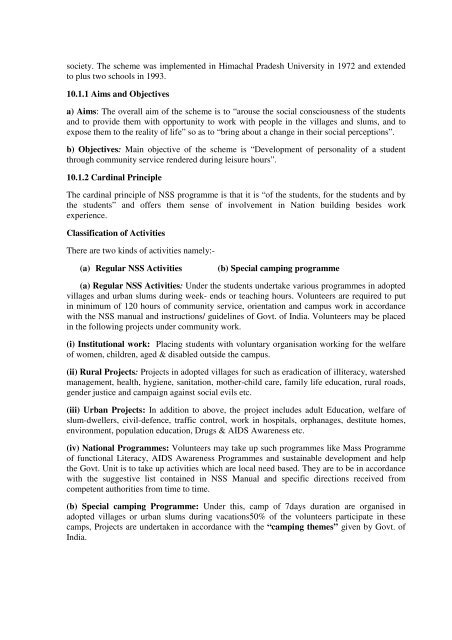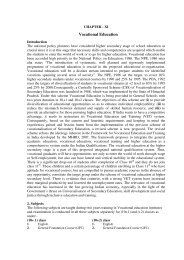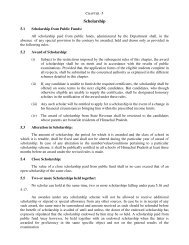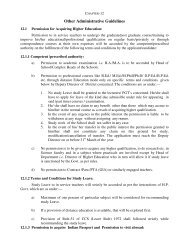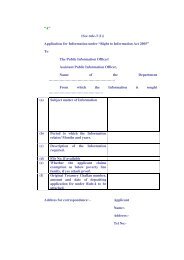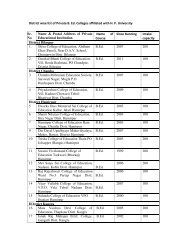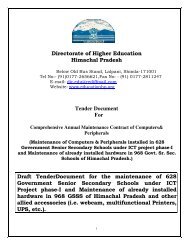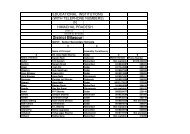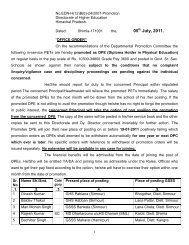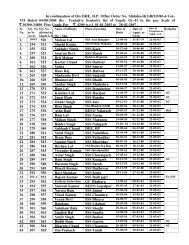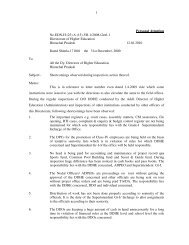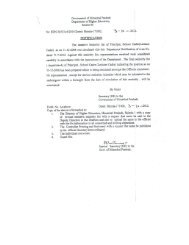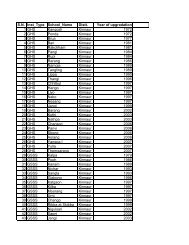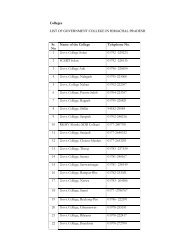Download - Department of Higher Education
Download - Department of Higher Education
Download - Department of Higher Education
Create successful ePaper yourself
Turn your PDF publications into a flip-book with our unique Google optimized e-Paper software.
society. The scheme was implemented in Himachal Pradesh University in 1972 and extended<br />
to plus two schools in 1993.<br />
10.1.1 Aims and Objectives<br />
a) Aims: The overall aim <strong>of</strong> the scheme is to “arouse the social consciousness <strong>of</strong> the students<br />
and to provide them with opportunity to work with people in the villages and slums, and to<br />
expose them to the reality <strong>of</strong> life” so as to “bring about a change in their social perceptions”.<br />
b) Objectives: Main objective <strong>of</strong> the scheme is “Development <strong>of</strong> personality <strong>of</strong> a student<br />
through community service rendered during leisure hours”.<br />
10.1.2 Cardinal Principle<br />
The cardinal principle <strong>of</strong> NSS programme is that it is “<strong>of</strong> the students, for the students and by<br />
the students” and <strong>of</strong>fers them sense <strong>of</strong> involvement in Nation building besides work<br />
experience.<br />
Classification <strong>of</strong> Activities<br />
There are two kinds <strong>of</strong> activities namely:-<br />
(a) Regular NSS Activities<br />
(b) Special camping programme<br />
(a) Regular NSS Activities: Under the students undertake various programmes in adopted<br />
villages and urban slums during week- ends or teaching hours. Volunteers are required to put<br />
in minimum <strong>of</strong> 120 hours <strong>of</strong> community service, orientation and campus work in accordance<br />
with the NSS manual and instructions/ guidelines <strong>of</strong> Govt. <strong>of</strong> India. Volunteers may be placed<br />
in the following projects under community work.<br />
(i) Institutional work: Placing students with voluntary organisation working for the welfare<br />
<strong>of</strong> women, children, aged & disabled outside the campus.<br />
(ii) Rural Projects: Projects in adopted villages for such as eradication <strong>of</strong> illiteracy, watershed<br />
management, health, hygiene, sanitation, mother-child care, family life education, rural roads,<br />
gender justice and campaign against social evils etc.<br />
(iii) Urban Projects: In addition to above, the project includes adult <strong>Education</strong>, welfare <strong>of</strong><br />
slum-dwellers, civil-defence, traffic control, work in hospitals, orphanages, destitute homes,<br />
environment, population education, Drugs & AIDS Awareness etc.<br />
(iv) National Programmes: Volunteers may take up such programmes like Mass Programme<br />
<strong>of</strong> functional Literacy, AIDS Awareness Programmes and sustainable development and help<br />
the Govt. Unit is to take up activities which are local need based. They are to be in accordance<br />
with the suggestive list contained in NSS Manual and specific directions received from<br />
competent authorities from time to time.<br />
(b) Special camping Programme: Under this, camp <strong>of</strong> 7days duration are organised in<br />
adopted villages or urban slums during vacations50% <strong>of</strong> the volunteers participate in these<br />
camps, Projects are undertaken in accordance with the “camping themes” given by Govt. <strong>of</strong><br />
India.


